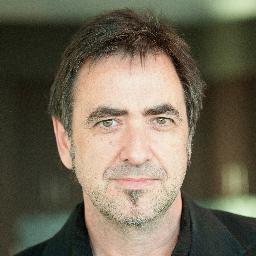Q: Why record an album now?
A: I had to wait for the technology to come to me; for the recording process to become so inexpensive and yet retain the high quality of recording studios and their expensive equipment. As little as 5-10 years ago, it would have been unthinkable to have made this album the way I did. Emotionally and artistically, I think I had to become hungry again -- I had been a professional musician since I was 14 years old and needed some time away from the business. So I did some book-writing, worked at a couple of churches, coached soccer, worked in children's musical theater, until I became stir-crazy longing to make music again.
Q: How does this record differ from Bourgeois Tagg musically?
A: I began to carve a solo path away from Bourgeois Tagg in 1990 with my first solo record; this is my fourth album since the last Bourgeois Tagg release. My solo writing, lyrically is naturally more introspective-that is what led me away from the band to begin with. I had undergone changes personally and spiritually, and was compelled to write about them, and the songs that arose were not really "band" material. But interestingly, there is a song on this record, Psycho, that features the whole band, and it sounds like we never left. And just to make sure, it is mixed by our first producer and engineer, David J. Holman.
Q: You seem at peace with yourself on this record. Do you agree?
A: The way this record came together was how it should be: organically, because I wanted to write and make music, with no pressure or deadlines from a company or no financial stake riding on its outcome. (That is not necessarily the case now!) Hopefully, that's reflected in the tone of the record-music being created because it's an enjoyable, peaceful thing to do.
Q: You are best known for the Beatle-esque song "I Don't Mind At All." What did that song mean to you personally and professionally?
A: Professionally, it still opens doors. It's funny -- it's one of those songs that people might not know who did it, but they know it. And as soon as you make the connection, it moves the needle. Personally, it's one of several collaborations with guitarist Lyle Workman, all of which I still consider among my best work and my favorites to perform.
Q: What did you do after Bourgeois Tagg?
A: recorded two mainstream solo albums on the Virgin/Charisma label. I wrote songs for publisher Lionel Conway, first at Island Music and then Maverick. And then my good friend Charlie Peacock encouraged me to come to Nashville, make a record for the Christian market, and dive in to producing there. I did that, produced many records (most notably three for Cindy Morgan,) wrote many songs with Michael W. Smith (and became his Music Director on the road for a year,) and eventually became the VP of A&R for Word Records. I signed Rachael Lampa and co-produced her first two albums, and signed Nicole C. Mullen. I made the Streams album. I guided Point of Grace through a couple of their records. When the music industry collapsed in 2002, I moved my family back to Northern California, and disappeared from the business for over ten years. I wrote three books, worked at two churches, coached youth soccer, and helped at my daughters' community musical theater.
Q: You've worked as an artist and an executive. What's your take on the music business today?
A: It is completely different -- unrecognizable -- from the one I left. Outside of a tiny, and still shrinking handful of artists on the three remaining major labels, people making music today are largely on their own to make anything happen. The public has almost completely gotten out of the habit of buying music. Music is just something they feel entitled to "have." So it is extremely difficult for all but a very few to make a living doing it. The advent of streaming sites like Spotify has almost nailed the coffin shut. Everyone can hear it, but no one is buying it. I could go on for days -- write a book...
Q: What else are you doing these days?
A: Outside of a little producing, the making and promoting of this record is occupying most of my time. Being Chief Cook & Bottle-washer of this enterprise is a full time job!
Q: You wrote a book critical of the religious right. Do you see the religious left making similar mistakes?
A: Yes, but they're not as loud, nor do they have nearly the audience. The left, in general, is more open to the questioning of ideas, long-held beliefs, and assumptions. My issue is with fundamentalism of all kinds, of all religions, of all politics. The idea that my way is the only way, that there is no room for your idea -- in fact, by the very nature of the fact that my idea is the only way, your idea is therefore heresy -- that has led to more war, evil, bad theology, bad politics, misinformation, and lack of compassion than almost anything else.
Q: What are your goals for the future?
A: Professionally my goal is modest. I would like to make a living writing, producing, and creating music. I would like to be a healthy contributor to the family income. Personally, I never want to stop learning. I want to be a more understanding, patient, loving husband and father.

